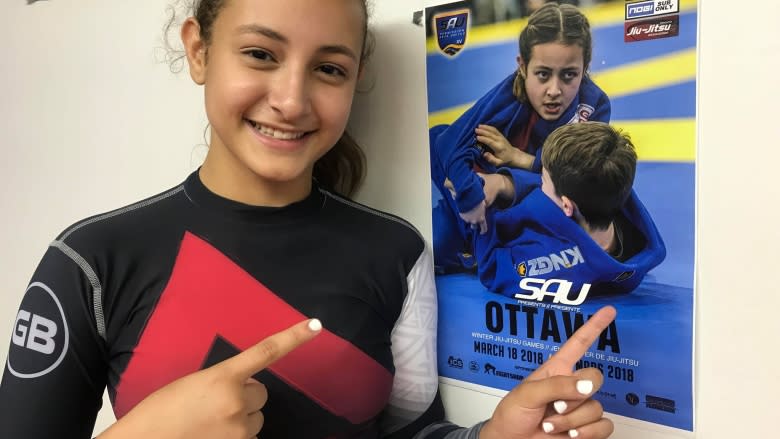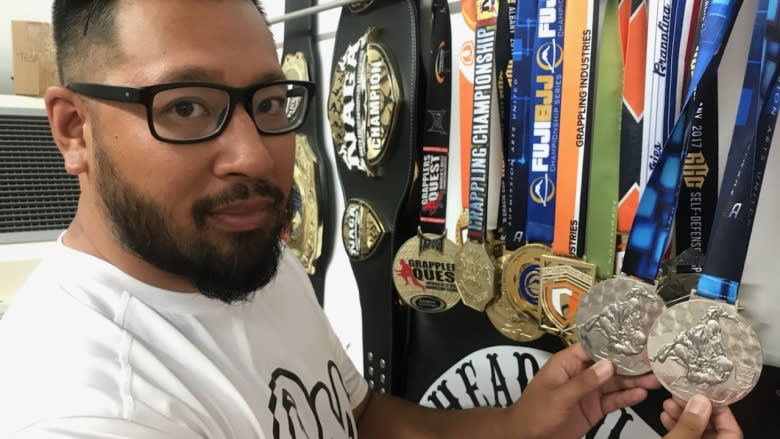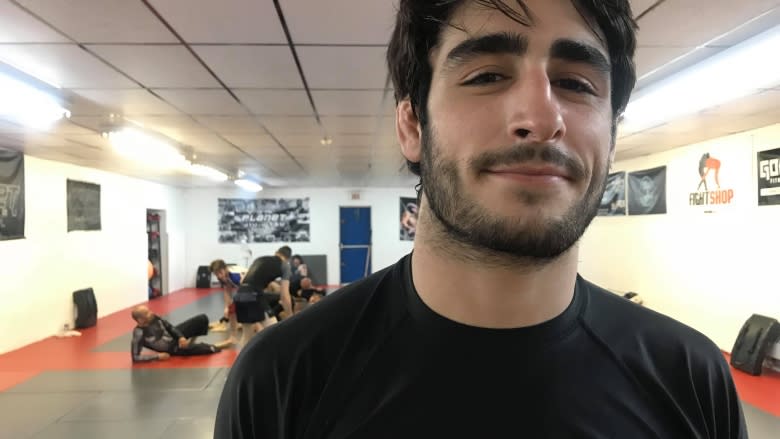Brazilian jiu-jitsu practitioners demand Quebec legalize their sport
Montreal's Brazilian jiu-jitsu community is fed up with the province's reluctance to legalize their martial art, even though it's a discipline that does not allow practitioners to throw kicks or punches.
It's a reality which is forcing many of Quebec's Brazilian jiu-jitsu aficionados out of the province to attend competitions — athletes like 12-year-old Gabriela Campos Mendanha.
"On a scale of zero to 10, it's like 105," she said, describing her level of frustration.
"Not everyone has the money to go travel everywhere," she said. "It has been a struggle for my parents because we don't have the money all the time, so we miss a lot of competitions."
Gabriela is one of many people of all ages honing their skills in Brazilian jiu-jitsu classes offered in and around Montreal.
The classes themselves are legal, but taking part in a competitive tournament is not.
"It's made for self-defence for small people like me to go against older and bigger people," Gabriela said.
She says the sport also helped her overcome bullying and helps girls defend themselves.
"It's not meant to hurt anyone."
Police crackdown
All forms of jiu-jitsu are illegal in most provinces, including Quebec, because of a 2013 amendment to Canada's Criminal Code.
That year, the House of Commons passed a bill redefining what constitutes an illegal "prize fight".
Although the bill mainly served to provide a legal framework for mixed martial arts (MMA), ironically, it led to the criminalization of several disciplines that are the basis of MMA.
"Imagine if you were a hockey fan, and all of a sudden the government tells you you're allowed to practise hockey, but you're not allowed to have a hockey match," said Martin Nguyen, a local tournament organizer who now promotes events in Ontario.
Montreal was supposed to host the Canadian championship of Brazilian jiu-jitsu in February 2017, but the event had to be moved to Ottawa after it was declared illegal.
Nguyen continued organizing competitions in Quebec until last year's crackdown put a stop to that.
"I am not comfortable telling a parent 'Yes, you can send your kid, and nothing will happen,' because I don't know."
Wasted opportunity in Quebec
Nguyen says he's seen firsthand how the sport has grown in popularity in Quebec over the last decade, and he says not capitalizing on that is a wasted opportunity.
"People love the UFC, right? But they don't realize that all these amateur sports like muay Thai [Thai boxing], jiu jitsu, they're all illegal," he said. "So how can we produce athletes of the future if the amateur sports are illegal?"
Nguyen says the law has forced many talented athletes to leave the sport, leaving only those who are truly devoted.
"I want to be competing at the highest level," said Francis St-Amour, a 25-year-old who travels regularly to the U.S. for tournaments. "Even if I want to do smaller competitions, I still have to go the U.S."
"But if I could stay here, I could pay less, I could it do more often, since we have a pretty good level of competition here in Quebec."
Why not Brazilian jiu-jitsu?
The federal law does leave the door open for provinces to legalize and regulate martial arts sports.
Three provinces — Ontario, British Columbia and Prince Edward Island — have done just that, making jiu-jitsu competitions legal in those jurisdictions.
In an email to CBC News, a spokesperson for the Ministry of Education and Sports said that Quebec is allowing amateur combat sports competitions if the sport is overseen by a federation or body approved by the province.
Karate, judo, taekwondo, wrestling and, as of earlier this year, kickboxing are all once again legal in the province.
When it comes to jiu-jitsu, which consists of grappling and ground manoeuvres, Quebec hasn't budged.
Members of Montreal's Brazilian jiu-jitsu community say they've been waiting for the province to outline what steps they have to take to legalize their competitions.
Last fall, a petition was submitted to the National Assembly calling for the legalization of various amateur martial arts sports, including Brazilian jiu jitsu.
In a written response to that petition, Sports Minister Sébastien Proulx said his ministry was evaluating different scenarios.
"It's not very clear the direction the government wants to take with our sport," said. Nguyen. "In Ontario, promoters worked hand in hand with the government, and they were told what they had to do."





